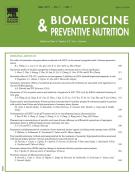Cytotoxic and antiproliferative effects of crude amphibian skin secretions on breast tumor cells - 01/03/13
 , Paulo Luiz de-Sá-Júnior b, Adilson Kleber Ferreira a, Alexandre Pereira b, Marta M. Antoniazzi c, Carlos Jared c, Daniel Carvalho Pimenta a
, Paulo Luiz de-Sá-Júnior b, Adilson Kleber Ferreira a, Alexandre Pereira b, Marta M. Antoniazzi c, Carlos Jared c, Daniel Carvalho Pimenta aAbstract |
Amphibian skin secretions are rich sources of biologically active compounds, including antimicrobial peptides, alkaloids and steroids. Bufadienolidic steroids, for instance, may inhibit tumoral cells migration and proliferation. Besides, alkaloids possess known antitumoral activity, being both capable of being employed in cancer therapy. In this work, we evaluated the effects of crude skin secretion solutions of eight Brazilian amphibians, selected for their known high contents of steroids, alkaloids, peptides and proteins, over two breast cell lines. The extract of amphibians were tested over MCF-7 and MDA-MB-231 cells by MTT assay, Hoechst/PI staining and acridine orange, in order to verify cell death and apoptosis. Treated cells were also analyzed by flow cytometer. The skin secretions were also analyzed by HPLC, mass spectrometry and poliacrilamide gel electrophoresis. Skin secretion solutions of Rhinella crucifer, R. major, R. schneideri, R. margaritifer and Phyllomedusa hypocondrialis were able to induce cytotoxic effects and provoke morphological alterations in both cell lines, including apoptotic bodies and cell death, as assessed by acridine orange and Hoechst/PI staining; nevertheless, these skin secretion solutions were poorly active over human erythrocytes. Flow cytometry assays showed that Rhaebo guttatus, R. crucifer, R. margaritifer, R. major and P. hypocondrialis skin secretions were able to inhibit cell growth and cause induction of cell cycle in the G2/M phase. Moreover, P. hypocondrialis skin secretion solution increased the number of tumor cells in the apoptotic sub-G1 peak. Based on these data, these amphibian skin secretions present themselves as a potential source for new molecules active on cancer cells.
Le texte complet de cet article est disponible en PDF.Keywords : Amphibia, Skin secretion, Breast cancer
Plan
Vol 3 - N° 1
P. 10-18 - janvier 2013 Retour au numéroBienvenue sur EM-consulte, la référence des professionnels de santé.
L’accès au texte intégral de cet article nécessite un abonnement.
Déjà abonné à cette revue ?

